Most Common Pests In Cannabis: White Flies
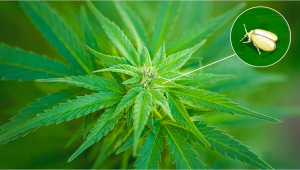
- 1. What are white flies?
- 2. What do white flies look like?
- 3. Where are they found?
- 4. What do white flies do?
- 5. White flies symptoms
- 6. How to prevent them?
- 7. How to deal with them?
- 8. Other common pests in cannabis
- 9. In conclusion
White flies affect all plants, including cannabis seeds. They hide on the underside of the leaves, where they reproduce and suck on the nutrients your plant has.
1. What Are White Flies?
White-flies are sap-sucking aphids that hide on the underside of the cannabis leaves. These white moth-looking bugs feed on the contents of your plant's leaves, draining out its energy. Lucky for you, they can be easily controlled and eliminated with insecticidal soaps, yellow sticky, and good airflow. These tiny white moths feed on the nutrients your plant holds and glue their eggs to your plant, making it difficult to remove them without damaging them. They can reproduce super fast, being able to lay up to 300 eggs that will hatch in around 24hs. And even though they're called flies, they're not flies at all. White flies are related to sap-sucking aphids.
2. What Do White Flies Look Like?
These bugs look like tiny white moths, they can grow up to 2mm long, have wings, and antennae, and can easily be spotted flying around your plant if you shake it a little bit.
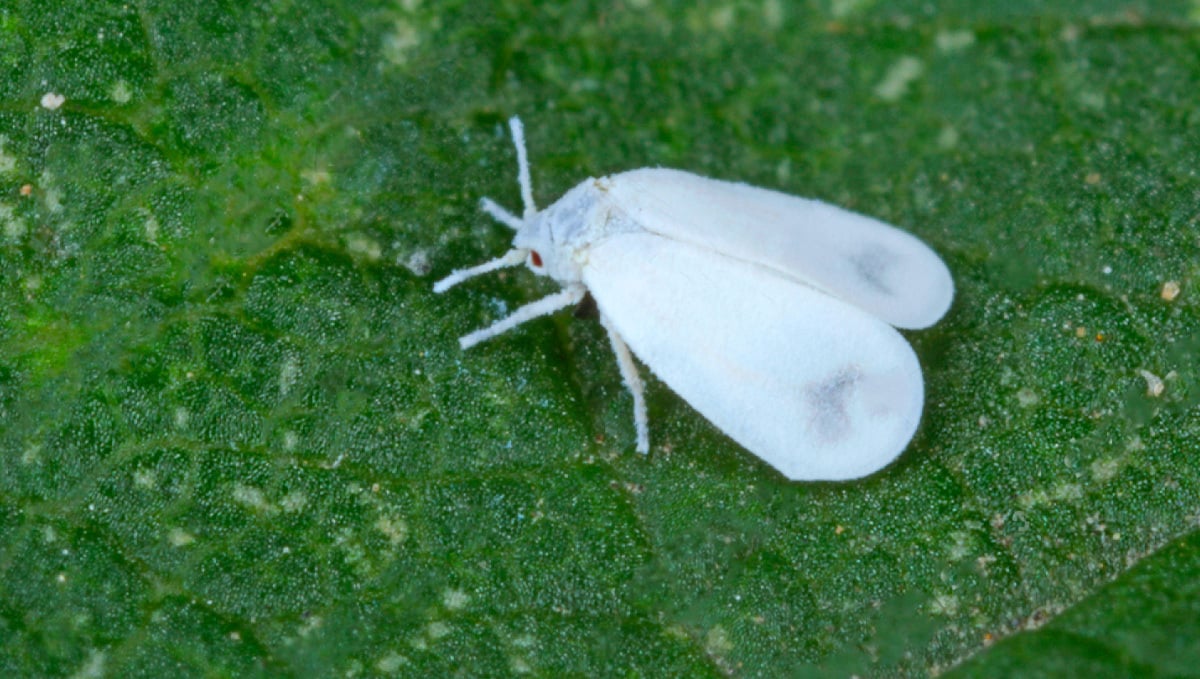
They usually have fluffy-looking legs and depending on where you live, they can have red eyes and a yellowish head.
3. Where Are They Found?
White flies can be found on any part of the plant, although they usually hide on the underside of the leaves, where they lay their eggs. It can be fairly easy to spot them because they will fly if you shake your plant. So if you shake it and look closely, you will be able to see them, despite their small size.
4. What Do White Flies Do?
White flies feed on the nutrients your plant contains, just like spider mites, they bite the leaves and suck out their content. They can lay up to 300 eggs, which can hatch in a day and completely mature in around four weeks, making it a pest that spreads fast.
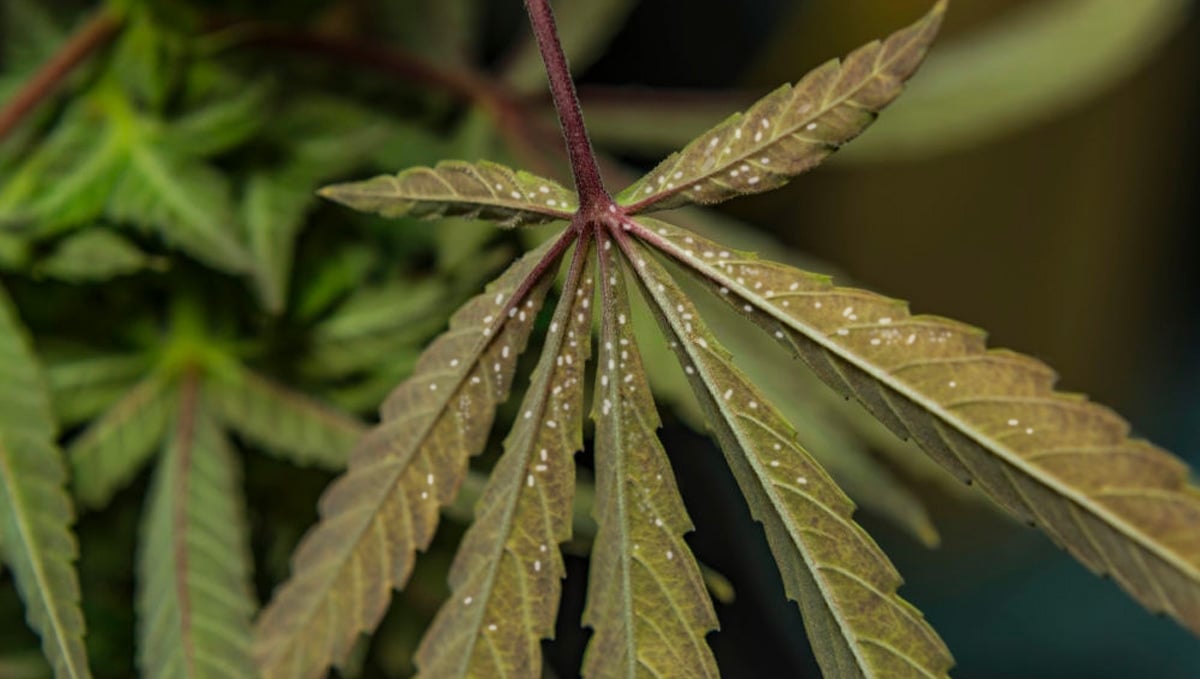
The eggs will hatch and the newborn white flies will start feeding on your plant, this is super dangerous because white flies can carry diseases that can gravely affect your plant.
5. White Flies Symptoms
You can find signs of white flies since the beginning, although the yellow spots they leave when feeding on your plant can be confused for other things, there is a way to be sure white flies are attacking your plants. To spot them, you need to shake your plant, this will cause them to fly off and you will clearly see them.
Another way is to check the underside of fan leaves for eggs, you should be able to see small white eggs glued under your leaves. Signs that a white flies infestation is getting serious is the yellowing and drying of the leaves. At this stage, leaves will start to die and fall off, and you will start to see reduced growth and overall development.
6. How To Prevent Them?
There’s not much you can do to prevent white flies, it is crucial to have a good air flow because this will cause them to not feel safe and look for another place to lay their eggs. Other than that, you should check your plants thoroughly every day.
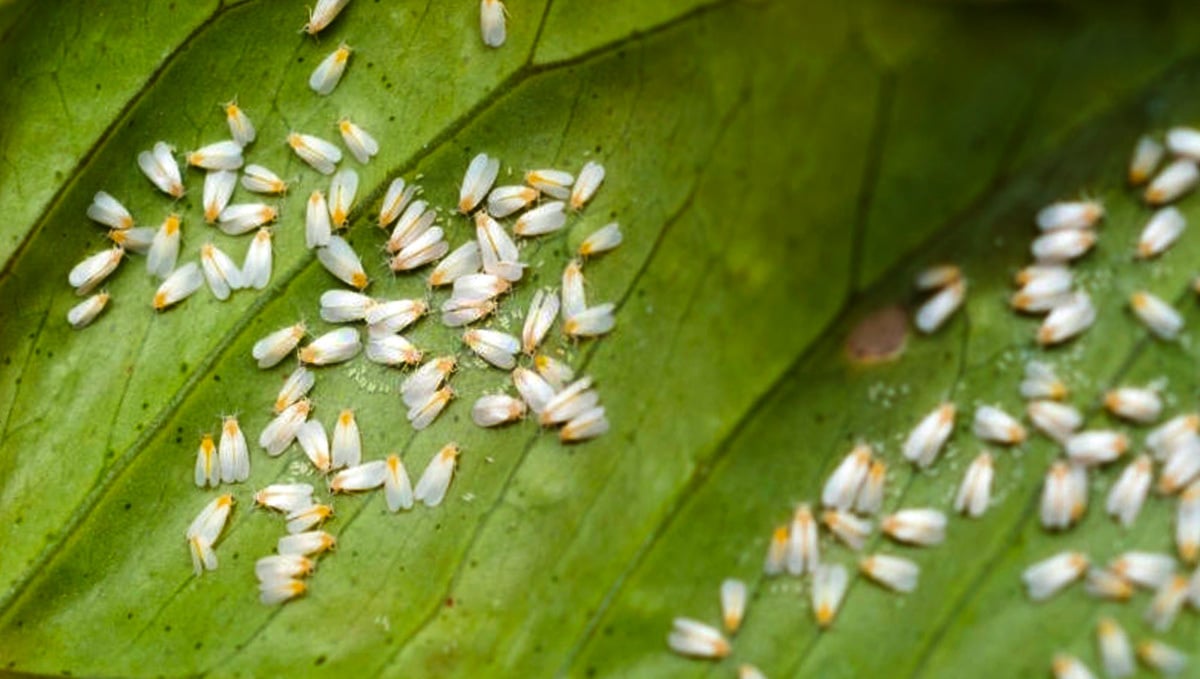
You can also place yellow sticky traps all throughout your growing space, although this won’t exactly prevent them you will see when they start to appear. Neem oil can be used as a foliar spray to help stop white flies from settling in, but we will get onto how to use this in the next section.
7. How To Deal With Them?
If you happen to get white flies you should spray your plant with organic insecticides and only move on to more aggressive insecticides if they’re not working. You can deal with them with Neem Oil or insecticidal soaps. Remember everything you spray on your plant can affect its growth, especially in the flowering stage, where it can affect the smell, flavor, and effect your buds will have.
The Best Options for White Fly Treatment and Prevention
There are multiple options for preventing and treating a white fly infestation. These include:
Essential oils
Although Neem oil is the most commonly used essential oil in cannabis cultivation, there are others that can help. Garlic, lemon, eucalyptus, rosemary, and cinnamon essential oils can be used in place of Neem.
Beneficial Predatory Insects
There is a long list of insects that you may want to keep around your crop from seed to harvest. These insects feed on either the larvae or full-grown pests themselves, all while taking no interest in the plants. These include Ladybugs, Lacewings, and Predatory mites, among others.
Neem oil
This can be used from the start of the veg growth stage all the way up to the last couple of weeks of flower. To apply Neem oil you will need to make up a solution that includes about 500mls of water, a few drops of insecticidal soap, and a teaspoon or so of Neem oil. Add this solution to a handheld pressure spray bottle (these can be found at any garden or hydro store, as well as at most large hardware stores) and give the plants a good spray.
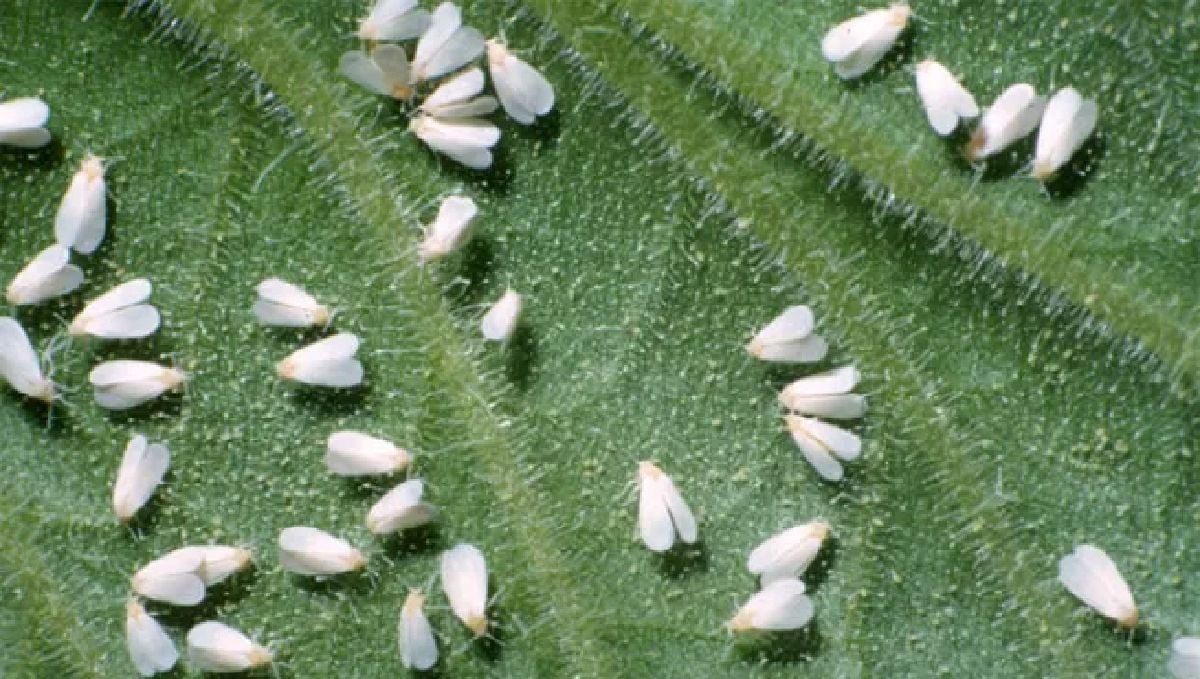
Ensure you cover the whole plant, and make sure that you don't miss the underside of the fan leaves as this is where white flies most commonly plant eggs. Keep in mind that need oil isn't great for your buds, so if the flowering stage has already begun be careful to not spray the bud sites.
Insecticidal soaps
These soaps are designed to soften the hard exoskeleton of insects, making them susceptible to dehydration and other treatment options like Diatomaceous Earth.
Diatomaceous Earth
These are the fossilized remains of shells, which while totally safe for humans and animals, are sharp enough at the microscopic level to cause huge issues for bugs. It causes the hard outer shell to be cut which causes the bugs to dehydrate and wither. This can be applied liberally at the base of the plant, and at any door or window entryway near the crop.
Spinosad Products
Made from the fermented Actinomycete Saccharopolyspora Spinosa, a specific type of soil, this is a totally organic option and fully safe for humans. While not as strong or effective as some of the other pesticide options, it does kill the white flies on contact. Spinosad has an effective half-life of about 24 hours, so only mix up enough for the one day otherwise the rest will be wasted. Keep in mind that these products are not allowed for commercial use in several USA states, so check the legality if you are a commercial grower.
Remember, some of these products can be used in conjunction with each other, while some are more suited to use all by themselves. Always check the labels, and be careful what you mix. The overall health of your crop is what is most important!
8. Other Common Pests in Cannabis
So, Whiteflies. Not the first thing you want to see climbing all over your cannabis crop, but also not the biggest issue. And although there aren't many steps you can take to straight out prevent Whiteflies, they are pretty easy to deal with if you catch them early. But how about other common pests and insects? Which ones do you need to be on the lookout for, and how do you deal with them?
Fungus Gnats
Fungus gnats are small, mosquito-like insects that feed on decaying plant matter and fungus. They can be found in soil, but their larvae will also attack the roots of cannabis plants. Luckily, they usually cause more cosmetic damage than actual harm to your crop. To get rid of these nasty bugs, it's best to keep some sticky traps hanging about, and biological controls like beneficial nematodes, and a sprinkling of diatomaceous earth around the base of the plant can also help.
Aphids
These small bugs come in a variety of colors and feed on the sap of cannabis plants. They can also spread disease and damage buds, so it's best to get rid of them as soon as possible. Neem oil is one of the most effective treatments for aphids. It's a natural, non-toxic insect repellent and can be used to both prevent and treat aphid infestations.
Spider Mites
These pesky pests are one of the most common problems growers encounter, and one of the most annoying. Spider mites feed on the sap of cannabis plants, causing yellow spots and webbing all over the leaves. Unless caught super early on, you’ll need to use a combination of chemical and biological treatments to get rid of spider mites. Insecticidal soaps, neem oil, horticultural oils, and predatory mites are all effective treatments for spider mite infestations.
Nematodes
Not an insect, but worth mentioning nonetheless. Nematodes are microscopic worm-like creatures that feed on the roots of cannabis plants. They appear in hydro systems and cause a decrease in yield and overall quality. The best solution for getting rid of nematodes is to use beneficial nematodes, which hunt down and devour the naughty nematode varieties.
Thrips
Thrips are almost microscopically small, fast-moving pests that feed on young leaves and buds. They can cause serious damage to cannabis plants if left untreated, as the lifecycle of thrips can be difficult to control once an infestation has occurred. Breeding females lay their eggs on the underside of fan leaves, but instead of sticking about, they drop down into the soil where they incubate and hatch. By the time they emerge from the soil or coco, they are already sexually mature adults, making control pretty tricky.
Caterpillars
Almost exclusively an outdoor cultivation issue, caterpillars can munch through cannabis plants with alarming speed. Prevention is the best cure here, so keep an eye out for eggs and try to remove them if spotted. They like to hang out on the underside of the leaves, so keep a keen eye out if you see caterpillar trails.
9. In conclusion
White flies won’t risk your harvest unless you let them be for a long time. Even though they reproduce quite fast, it will take a lot of white flies to kill your plant. Your plant will go through a process of slowly running out of nutrients, yellow and the leaves falling off before it starts dying, so you have a fair amount of time to deal with them. As always, remember the best way to avoid having any problems is to grow in a good environment and check for any kind of bugs every day.









Comments